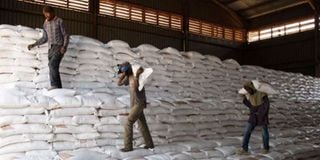State moves to compensate farmers for bad fertiliser

Workers arrange bags of subsidised fertiliser at the National Cereals and Produce Board depot in Elburgon, Nakuru County.
What you need to know:
- Farmers are required to present their original national identity cards and evidence of purchase, and any remaining samples.
- Agricultural experts said affected farmers might be forced to replant.
Farmers who bought substandard fertiliser under the government subsidy programme are relieved after the National Cereals and Produce Board (NCPB) initiated a compensation process.
The agency has directed all farmers who bought KEL fertiliser to lodge formal claims. The claim form will be provided at the depot or selling centre where they bought the fertiliser to facilitate the compensation process.
Farmers are required to present their original national identity cards and evidence of purchase, and any remaining samples.
“All farmers who have utilised the fertilisers and NCPB has verified that they procured from their stores will be issued with an equivalent amount of the top-dressing fertiliser. In the case of farmers who procured and have not utilised the fertiliser, they will be required to return the product to NCPB stores and be issued with an equivalent amount of planting fertiliser.
“Farmers’ documentation must match with the existing records at NCPB’s silos or depots,” read a statement signed by Titus Maiyo, NCPB’s corporate communications manager.
The move follows a directive by the Ministry of Agriculture that all farmers who bought KEL fertilisers be compensated.
Some maize farmers in the North Rift region who used the substandard fertiliser on Wednesday said the crop has recorded stunted growth. Agricultural experts said affected farmers might be forced to either replant or apply additional nutrients to help the crop to recover.
“The government needs to dispatch a technical team of crop experts from Kephis (Kenya Plant Health Inspectorate Service) and Kebs (Kenya Bureau of Standards) to map out the affected areas and hasten the process of cushioning farmers from impending losses,” said Ezekiel Koech, an Eldoret-based agronomist.
A spot check in Tindiret and Mosop, Nandi County, where there have been reported cases of crop discolouration, revealed patches of stunted maize plants. Other affected areas are Moi’s Bridge, Ziwa and Turbo.
“The maize crop has experienced poor germination and growth since it was planted a month ago. There are unusual splashes of purple and yellow, an indication that it is lacking specific nutrients,” said Elias Kipkorir, a manager at Barngetuny farm in Tindiret, Nandi County.
Some of the farmers who spoke to the Nation yesterday said that they were forced to use urea components, which had helped in the recovery of some of the maize crop.
“I have bought bags of top dressing which I will apply to that crop, two bags per acre. If it was not for urea, I think things would have been different this season,” said Mr James Kosgei from Mosop.
Mr Joshua Chumba from Moiben said that his farm’s production is likely to decrease this season.
“Although there was even germination of the maize crop, the plant started developing some discolouration,” said Mr Chumba.
A senior official at the Ministry of Agriculture said they have received complaints from farmers over the poor growth of the maize crop and that measures have been put in place to mitigate the problem.





